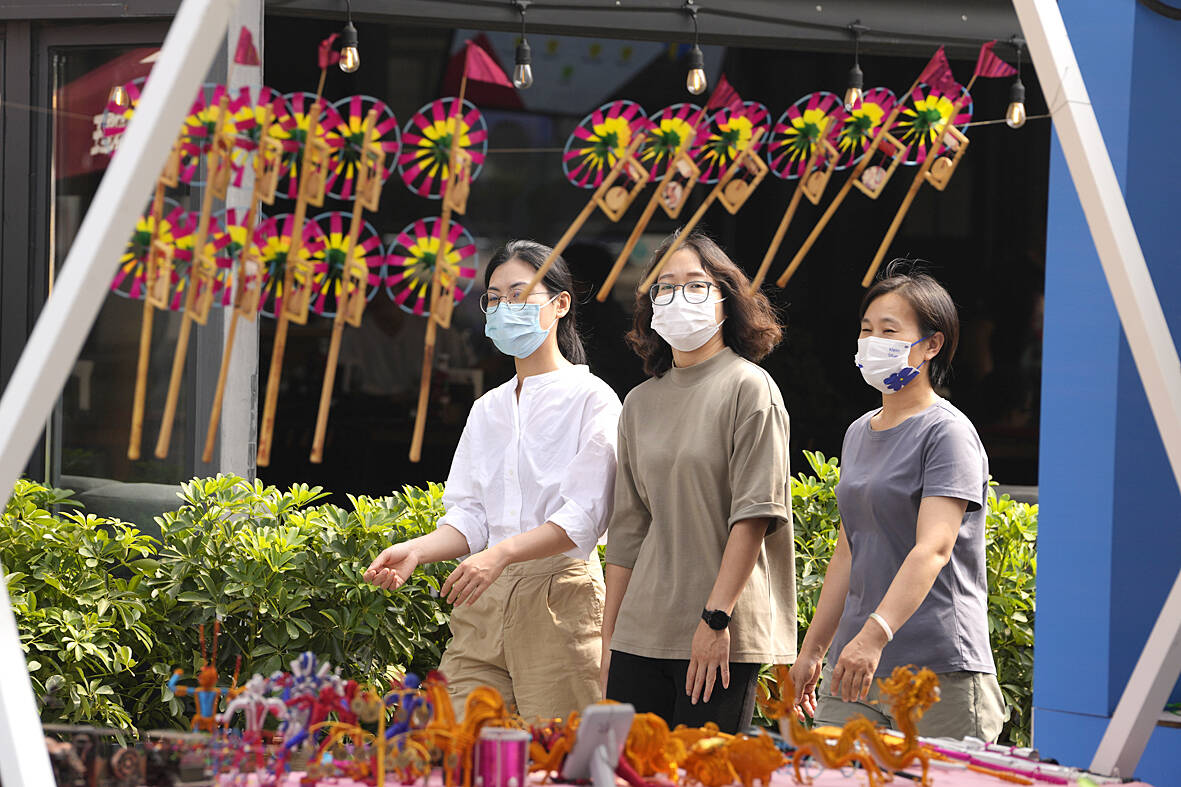Women who identify as Asian Americans and Pacific Islanders are more likely to face barriers in investment management than their white or male counterparts, a new study shows — and several people interviewed by Bloomberg echoed those findings.
Eight in 10 AAPI women surveyed see various individual, cultural, and organizational challenges — commonly referred to as the “bamboo ceiling” — as potential impediments to rising through the management ranks, according to an Association of Asian American Investment Managers report released Tuesday.
Of the 608 people who responded to the survey, 174 identified themselves as AAPI women, and 57 percent of that cohort said they were personally affected by the bamboo ceiling. Many also reported having to assert themselves more than their male peers in order to be recognized, promoted or credited for their work.

Photo: AP
“Especially when trying to move up in the ranks, the onus was on women to prove themselves,” Melissa Maquilan Radic, a former BlackRock Inc executive whose parents immigrated to the US from the Philippines, said in a phone interview, speaking generally about her experiences in the corporate world. “I would look at women who had similar job titles to men, and their qualifications were twice as robust.”
The work of her parents, both practicing physicians, taught her the importance of establishing credibility as a woman by comparing her mother’s career with that of her father’s.
Maquilan Radic, 40, was one of several AAPI women who shared similar experiences of having to meld their identities and communication styles to get ahead.
“You’ve got to be so much better that there is really no question you are the best one and there is no alternative to you,” said Dynex Capital Co-Chief Investment Officer Smriti Popenoe, a native of India with three-decades of experience in finance.
‘GUY TALK’
Popenoe, who was schooled across three continents during her youth, said she was accustomed to adapting to various cultures and circumstances in order to be competitive as the only immigrant, woman or person of color in the room.
“The others, they were white men that could play golf, that could talk sports,” said Popenoe, 53. “You really have to talk the native language of the male-dominated industry — the guy talk — and I learned that language.”
Roughly two-thirds of the AAPI respondents said race plays a role in limiting opportunities, compared with just 23 percent of those who didn’t identify as Asian American or Pacific Islander.
The AAPI women interviewed by Bloomberg said they had to actively seek mentorship opportunities with superiors who recognized their potential and made efforts to lift them up.
“Getting to the managing director position — that part requires a lot more advocacy and sponsorship,” said Amy (Wu) Stratton, 46, a former Citigroup Inc. executive who recently founded MyAsianVoice, an organization that supports Asian women. “Even though I had a full network and a lot of folks expected me to be there already, in actuality it requires people to do the advocacy work. So I really had to rattle folks to get it done.”
Brenda Chia, AAAIM’s founding president, said young AAPI women need to constantly vocalize their presence and advocate for themselves and their work.
Often, ideas they propose “are not taken seriously or are stolen by other people,” said Chia, who spent the beginning of her career in Singapore before moving to the US, where she’s now chief of capital development for Paladin Capital Group. It’s “incredibly important to speak up consistently about what you believe in to make sure that they know you originated it.”

On April 26, The Lancet published a letter from two doctors at Taichung-based China Medical University Hospital (CMUH) warning that “Taiwan’s Health Care System is on the Brink of Collapse.” The authors said that “Years of policy inaction and mismanagement of resources have led to the National Health Insurance system operating under unsustainable conditions.” The pushback was immediate. Errors in the paper were quickly identified and publicized, to discredit the authors (the hospital apologized). CNA reported that CMUH said the letter described Taiwan in 2021 as having 62 nurses per 10,000 people, when the correct number was 78 nurses per 10,000

As we live longer, our risk of cognitive impairment is increasing. How can we delay the onset of symptoms? Do we have to give up every indulgence or can small changes make a difference? We asked neurologists for tips on how to keep our brains healthy for life. TAKE CARE OF YOUR HEALTH “All of the sensible things that apply to bodily health apply to brain health,” says Suzanne O’Sullivan, a consultant in neurology at the National Hospital for Neurology and Neurosurgery in London, and the author of The Age of Diagnosis. “When you’re 20, you can get away with absolute

May 5 to May 11 What started out as friction between Taiwanese students at Taichung First High School and a Japanese head cook escalated dramatically over the first two weeks of May 1927. It began on April 30 when the cook’s wife knew that lotus starch used in that night’s dinner had rat feces in it, but failed to inform staff until the meal was already prepared. The students believed that her silence was intentional, and filed a complaint. The school’s Japanese administrators sided with the cook’s family, dismissing the students as troublemakers and clamping down on their freedoms — with

As Donald Trump’s executive order in March led to the shuttering of Voice of America (VOA) — the global broadcaster whose roots date back to the fight against Nazi propaganda — he quickly attracted support from figures not used to aligning themselves with any US administration. Trump had ordered the US Agency for Global Media, the federal agency that funds VOA and other groups promoting independent journalism overseas, to be “eliminated to the maximum extent consistent with applicable law.” The decision suddenly halted programming in 49 languages to more than 425 million people. In Moscow, Margarita Simonyan, the hardline editor-in-chief of the